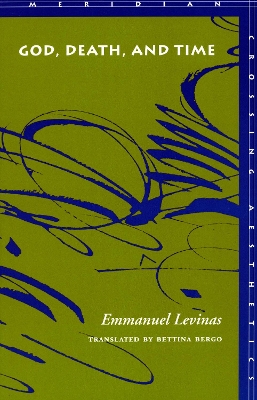Meridian: Crossing Aesthetics
4 total works
Appropriately Levinas pursues this project by discussing the work of others, of philosophers among his contemporaries who bring out and champion a thought that realizes and sustains the proximity of person to person.
This book consists of transcripts from two lecture courses Levinas delivered in 1975-76, his last year at the Sorbonne. They cover some of the most pervasive themes of his thought and were written at a time when he had just published his most important—and difficult—book, Otherwise than Being, or Beyond Essence. Both courses pursue issues related to the question at the heart of Levinas's thought: ethical relation. The Foreword and Afterword place the lectures in the context of his work as a whole, rounding out this unique picture of Levinas the thinker and the teacher.
The lectures are essential to a full understanding of Levinas for three reasons. First, he seeks to explain his thought to an audience of students, with a clarity and an intensity altogether different from his written work. Second, the themes of God, death, and time are not only crucial for Levinas, but they lead him to confront their treatment by the main philosphers of the great continental tradition. Thus his discussions of accounts of death by Heidegger, Hegel, and Bloch place Levinas's thought in a broader context. Third, the basic concepts Levinas employs are those of Otherwise than Being rather than the earlier Totality and Infinity: patience, obsession, substitution, witness, traumatism. There is a growing recognition that the ultimate standing of Levinas as a philosopher may well depend on his assessment of those terms. These lectures offer an excellent introduction to them that shows how they contribute to a wide range of traditional philosophical issues.
The thirteen essays collected in this volume investigate the possibility that the word "God" can be understood now, at the end of the twentieth century, in a meaningful way. Nine of the essays appear in English translation for the first time.
Among Levinas's writings, this volume distinguishes itself, both for students of his thought and for a wider audience, by the range of issues it addresses. Levinas not only rehearses the ethical themes that have led him to be regarded as one of the most original thinkers working out of the phenomenological tradition, but he also takes up philosophical questions concerning politics, language, and religion. The volume situates his thought in a broader intellectual context than have his previous works. In these essays, alongside the detailed investigations of Husserl, Heidegger, Rosenzweig, and Buber that characterize all his writings, Levinas also addresses the thought of Kierkegaard, Marx, Bloch, and Derrida.
Some essays provide lucid expositions not available elsewhere to key areas of Levinas's thought. "God and Philosophy" is perhaps the single most important text for understanding Levinas and is in many respects the best introduction to his works. "From Consciousness to Wakefulness" illuminates Levinas's relation to Husserl and thus to phenomenology, which is always his starting point, even if he never abides by the limits it imposes. In "The Thinking of Being and the Question of the Other," Levinas not only addresses Derrida's Speech and Phenomenon but also develops an answer to the later Heidegger's account of the history of Being by suggesting another way of reading that history.
Among the other topics examined in the essays are the Marxist concept of ideology, death, hermeneutics, the concept of evil, the philosophy of dialogue, the relation of language to the Other, and the acts of communication and mutual understanding.


